Battery With MSMD Method, CFD Simulation, Ansys Fluent Training
$120.00 $60.00 Student Discount
- The current CFD project simulates the temperature distribution of a Battery via ANSYS Fluent software.
- We have designed the geometry using ANSYS Design modeler software and created the mesh on this geometry using ANSYS meshing software.
- The mesh type is Structured with 66,950 cells.
- MSMD (Multi-Scale Multi physics Battery) Battery Model is used to analyze the current problem.
To Order Your Project or benefit from a CFD consultation, contact our experts via email (info@mr-cfd.com), online support tab, or WhatsApp at +44 7443 197273.
There are some Free Products to check our service quality.
If you want the training video in another language instead of English, ask it via info@mr-cfd.com after you buy the product.
Description
Description
The current project simulates a potential dual battery using ANSYS Fluent software. The battery has a nominal voltage of 24 amps with C-RATE 10. For the material, specific thermal conductivity and electrical conductivity are defined.
The geometry of the present model is designed using Design Modeler software. A structured mesh grid is also carried out to prevent extra computational cost and increase accuracy using ANSYS Meshing software. Thus, 66950 elements were generated in total.
Methodology: Battery With MSMD Method
In order to simulate a potential dual battery, the Battery module with the MSMD Method in ANSYS Fluent is employed. Also, the energy equation is available to consider temperature distribution along the battery.
Conclusion
After the simulation, contours of temperature distribution and the potential distribution are extracted. It is clear that the higher the C RATE of the battery, the faster it will charge and discharge, and the temperature created in the battery will increase.
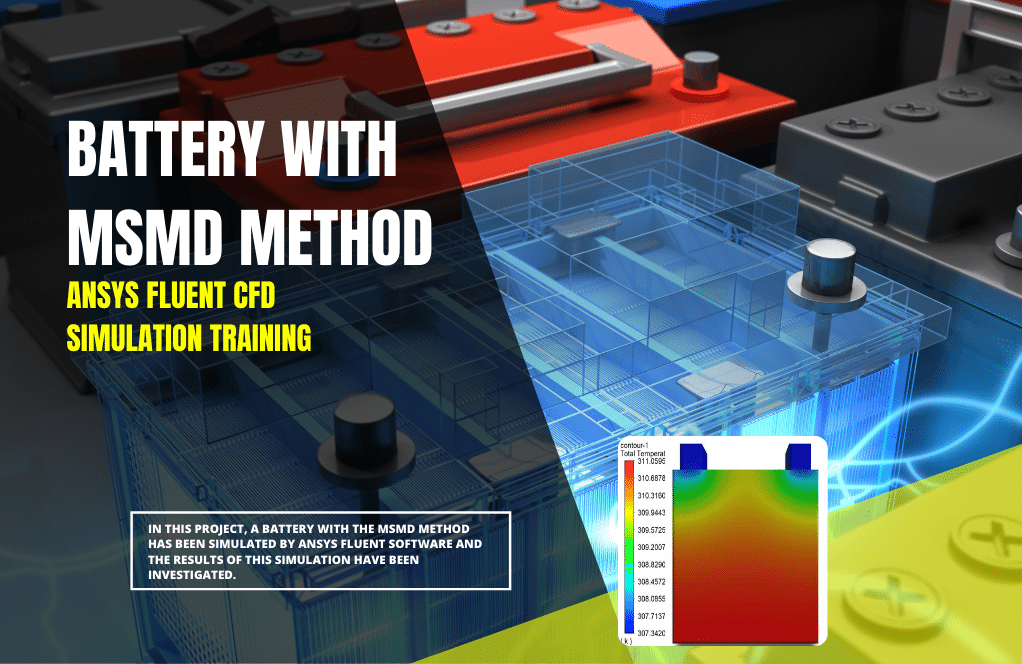
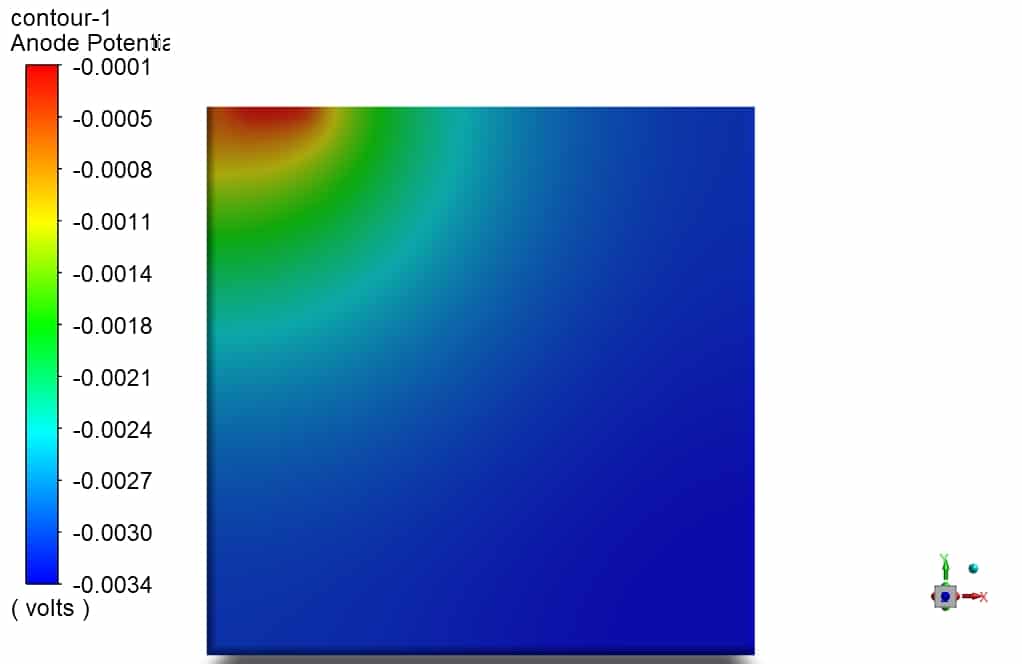
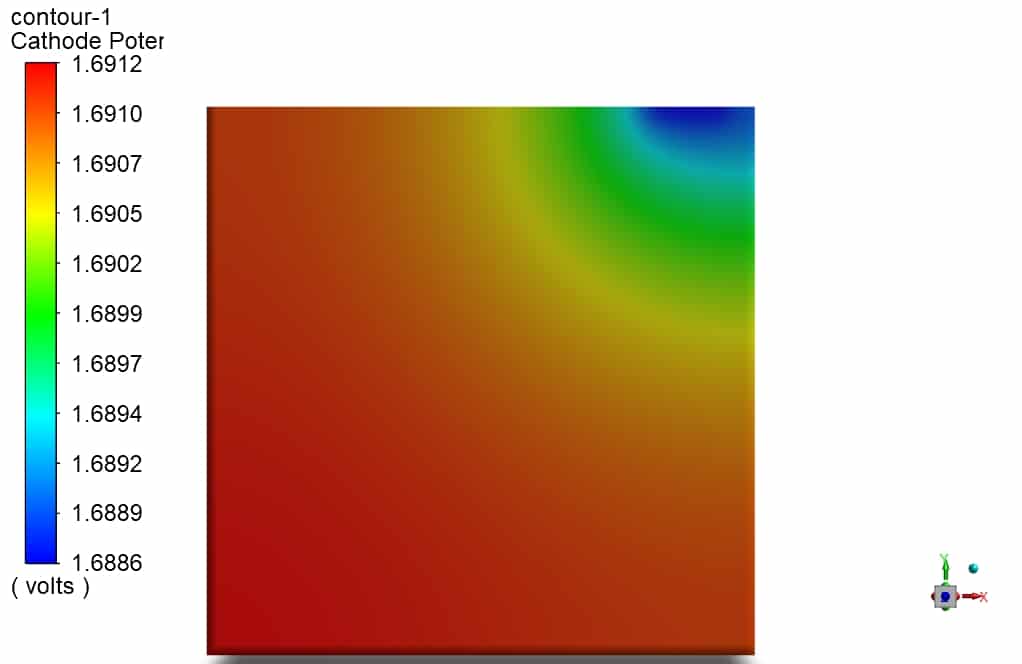

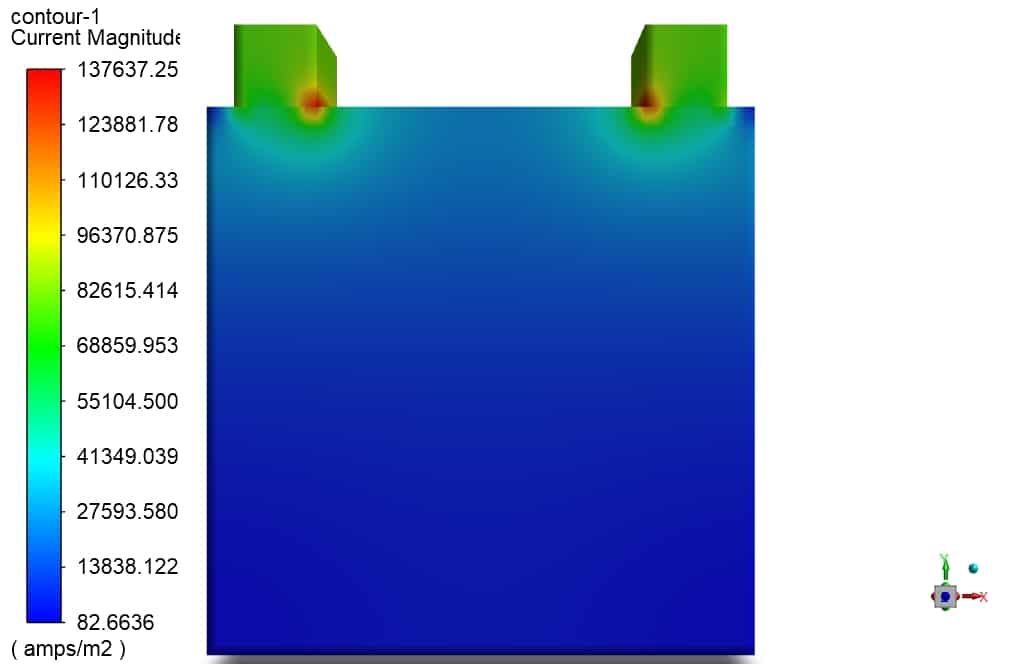
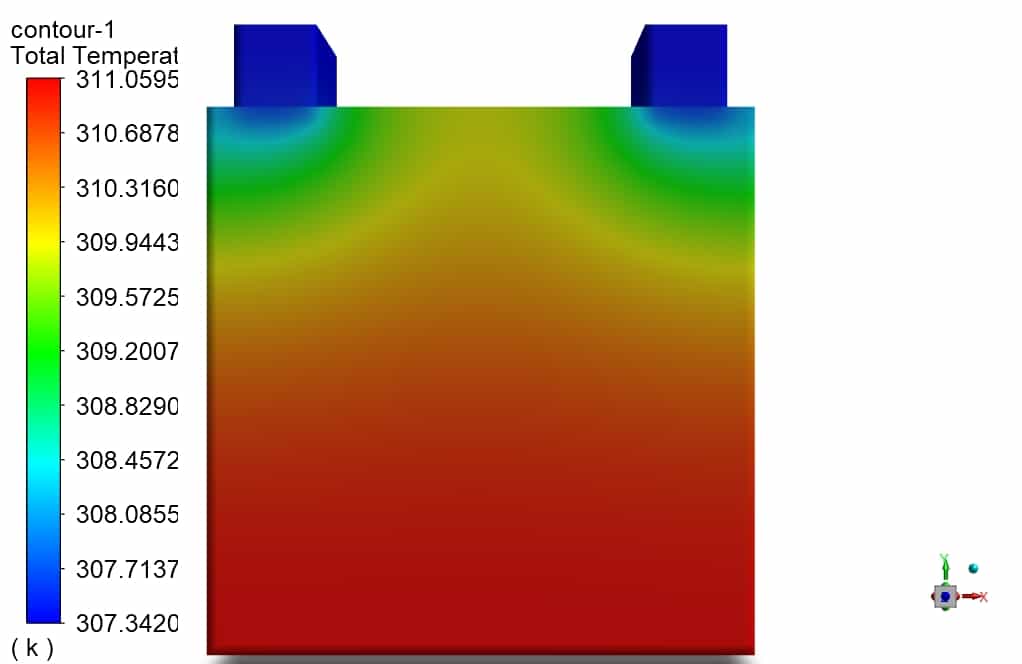

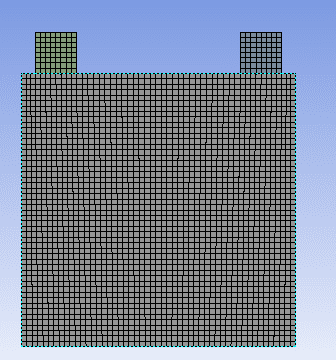

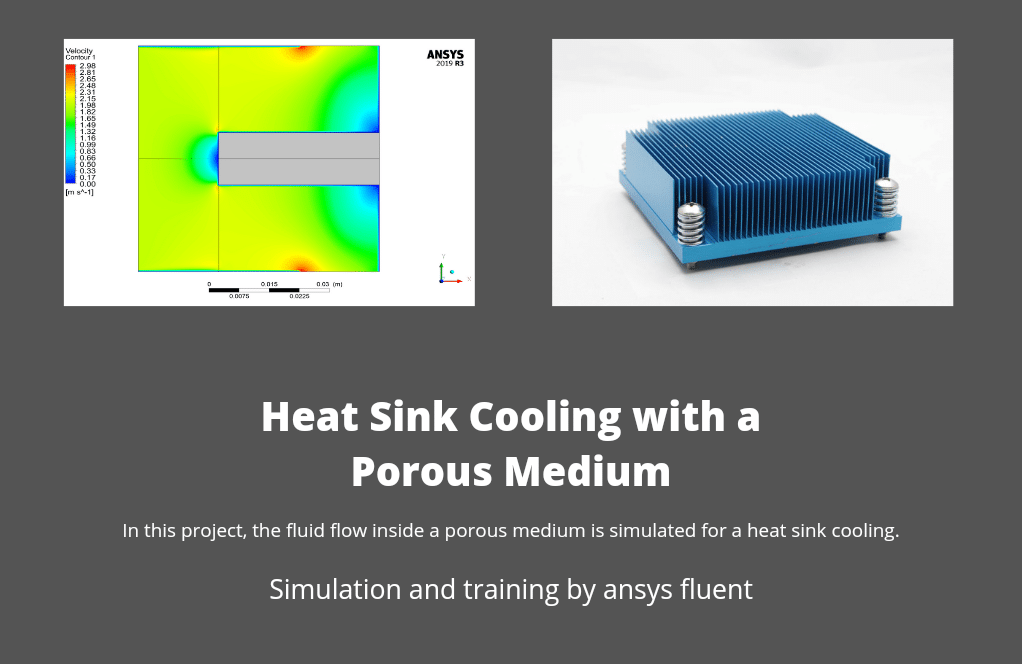


Bianka Abernathy –
This tutorial really helped me understand the MSMD Method for simulating a dual battery. I could follow along and set up my own simulation without any issues. The explanations were thorough, and the temperature distribution results aligned perfectly with the theory. Great work on creating such a detailed and productive learning resource!
MR CFD Support –
Thank you for your positive feedback! We’re delighted to hear that our training on ‘Battery With MSMD Method, CFD Simulation, Ansys Fluent’ met your expectations and was instrumental in advancing your simulation skills. It’s great to know that the material was clear and the results were spot on. If there’s anything more we can assist you with, don’t hesitate to reach out to us!
Miss Jayne Kassulke Sr. –
This training made battery simulation really accessible. The step by step explanation was very helpful. Excited to apply these methods in my project!
MR CFD Support –
We’re thrilled to hear that our training on battery simulation with the MSMD Method in ANSYS Fluent was helpful to you. It’s gratifying to know it has provided you with the tools needed to apply these techniques to your own project. Thank you for your positive feedback, and we wish you the best with your simulation endeavors!
Fred Reilly –
I’m really impressed by the detail in the simulation for the dual battery using the MSMD Method. It’s fascinating to see how different C-RATE levels affect temperature. Great job!
MR CFD Support –
Thank you for your kind words and for recognizing the detail in our simulation project. At MR CFD, we strive to provide comprehensive simulations that can help our customers understand complex phenomena like battery behavior under different conditions. We’re glad to hear that you found the insights on the effect of C-RATE levels on temperature both fascinating and valuable!
Alyson Langosh –
I was impressed by the way temperature and potential distribution are presented in the simulation. It makes it easy to understand the performance of a high C-RATE battery under different conditions.
MR CFD Support –
Thank you for your kind words! It’s great to hear that our CFD simulation for the dual battery using the MSMD Method in ANSYS Fluent was able to clearly demonstrate the temperature and potential distribution. We strive to present complex data in an understandable way, and I’m glad we succeeded in providing valuable insights for your interests.
Prof. Edgardo Feil Jr. –
I thoroughly enjoyed the depth provided in the CFD simulation of the dual battery project using the MSMD Method. The insights on temperature and potential distribution were incredibly informative, and seeing the effect of C-RATE on charging and temperature was particularly fascinating.
MR CFD Support –
Thank you for your positive feedback! We’re glad to hear that you found the information on temperature and potential distribution insightful and the observations on the impact of C-RATE both fascinating and useful. If you ever have more questions or need further assistance in your CFD learning journey, please don’t hesitate to reach out.
Miss Alysa Wunsch –
I highly appreciate how well the battery simulation mimicked the characteristics of a real-life battery. The details about the use of the MSMD Method and the accounting for temperature distribution speak to the thoroughness with which this project was carried out. The structured mesh grid also likely contributed to the precision of the results. Truly impressive work!
MR CFD Support –
Thank you for your kind words! We’re glad you recognized the efforts taken in accurately setting up the simulation with the MSMD Method and structuring the mesh grid for optimal accuracy and computational efficiency. Your feedback is very much appreciated!
Tressa Powlowski DVM –
Glad to see the contours of temperature and potential can be derived accurately. The insights on the effects of C-RATE on battery charge/discharge and temperature dynamics are particularly valuable.
MR CFD Support –
Thank you for your positive feedback! We’re delighted to know that you found the temperature and potential distribution contours useful and that our simulation provided you with valuable insights into the battery’s performance. We appreciate your recognition of the accuracy of our work at MR CFD Company.
Neoma Stiedemann –
Since higher C-RATEs lead to faster charge and discharge cycles, does that also imply that such batteries would have a shorter lifespan due to the higher operational temperatures?
MR CFD Support –
Yes, typically, higher operational temperatures caused by faster charge and discharge cycles associated with higher C-RATEs can lead to accelerated battery degradation and may reduce the overall lifespan of the battery.
Queen Kovacek –
I’ve recently completed a simulation course on the Battery With MSMD Method using ANSYS Fluent from MR CFD Company, and I am thoroughly impressed with the quality of their training materials. The structured approach to simulating a dual battery really cemented my understanding of the subject.
MR CFD Support –
Thank you for your positive feedback! We are thrilled to hear that you found the simulation course beneficial and that it helped deepen your understanding of battery simulation using ANSYS Fluent. If you have any more questions or require further assistance, feel free to reach out to us!
Jermaine Zemlak –
I really enjoyed learning about the Battery With MSMD Method simulation! It helped me understand the thermal aspects of battery operations in great detail. The step-by-step approach in the tutorial made complex concepts much easier to grasp. Kudos to MR CFD Company for such a comprehensive learning product!
MR CFD Support –
Thank you for taking the time to leave such a positive review! We’re thrilled to hear that our Battery With MSMD Method simulation was able to provide you with detailed insights and a clearer understanding of the thermal operations within batteries. Your feedback is greatly appreciated, and we look forward to offering you more valuable learning experiences in the future!
Mr. Richie Walker MD –
I found the simulation of the potential dual battery fascinating. It’s remarkable how it takes into account the temperature distribution which can be critical in battery management. Great job showcasing the impact of the C-RATE on charging, discharging, and thermal aspects!
MR CFD Support –
Thank you for your positive feedback! We’re glad you recognize the importance of temperature distribution in a battery simulation. Accurate CFD modeling is a critical part of understanding and improving battery performance. We strive to provide detailed and focused training that our customers can apply in such complex analyses. Your appreciation is highly valued, and we look forward to continuing to serve your learning needs.
Garth Witting –
I’m very impressed with the level of detail in the simulation for the cooling behavior of the battery. It is fascinating to see how the temperature distribution affects the battery’s efficiency.
MR CFD Support –
Thank you so much for your kind words! We are thrilled to hear that the detail in our battery cooling simulation was able to impress you. Understanding temperature distribution is crucial for optimizing battery efficiency and we’re glad our product could provide you with those insights.